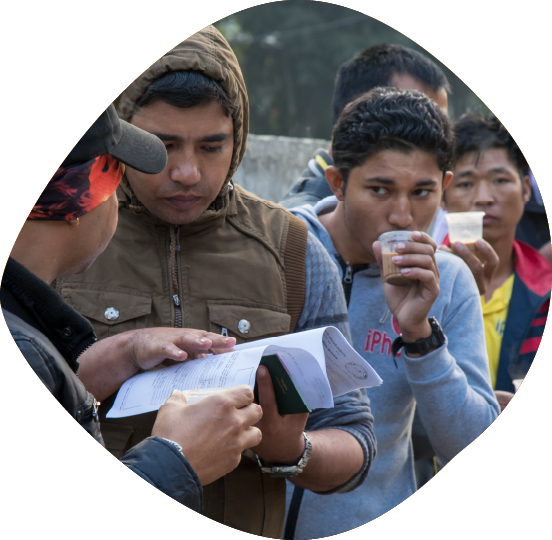 BIG PICTURE STORY
BIG PICTURE STORY
AGRUMIG: Identify and harness the benefits of migration
Across the globe, millions of people leave their home countries in search of new opportunities, driven by poverty, conflict, political instability, climate change, a lack of employment options and other factors. While attention is paid to the countries that receive migrants, there has been much less focus on the locations from where these migrants originate. Agricultural communities in particular experience high levels of outward migration, as their livelihoods are impacted by increasingly erratic weather patterns, land access challenges and a new generation seeking greater access to cash income.
Through the AGRUMIG project, researchers examined the impacts of outmigration on agricultural communities in seven low- and middle-income countries: China, Ethiopia, Kyrgyzstan, Moldova, Morocco, Nepal and Thailand.
The International Water Management Institute (IWMI) and other AGRUMIG project partners aimed to understand the benefits of migration for sustainable development, contributing insights to policy dialogues at different levels, and focusing on strengthening opportunities and instruments for migration governance. There are multiple potential advantages of migration. However, IWMI recognizes that without effective policy and governance frameworks in place, these benefits may not be fully realized or equitably distributed.
Threats to food production and personal security
For farming communities, the impacts of the demographic changes caused by migration can be significant. In Nepal, for instance, women have been forced to take on farm labor and decision-making roles due to the large number of young men that have left the country, which is estimated as being up to four million per year. Yet, women seldom have access to credit facilities and do not have formal land titles. Declining yields may have also contributed to the departure of some men. These factors can put both livelihoods and food production at risk.
At the global level, migrating women and girls can also face significant risks. Along the Mediterranean route, many are victims of serious gender-based violence, while ‘unfair’ labor agreements between South Korea and Thailand can result in women being prevented from finding work through legal channels.
 A ‘positive migration’ approach
A ‘positive migration’ approach
Strong governance and policy frameworks can address these pressing issues and ensure that both ‘sending’ and ‘receiving’ countries benefit from migration. By adopting an integrated approach, labor gaps can be filled, tax revenue generated, and innovation and entrepreneurship encouraged. Workers who travel abroad in pursuit of higher or more secure incomes have the opportunity to acquire knowledge, social capital, networks, skills and ideas – often referred to as ‘social remittances’. This can result in far greater rewards – for themselves and their communities – when they eventually return home, with new capacity invested in setting up new businesses or expanding existing ones.
This can be of particular value in rural agricultural communities. Through the AGRUMIG project, researchers highlighted the case of a Thai man who had spent several years working in Israel and South Korea. On his return home, he was able to improve irrigation and fertilization techniques on his farm and sell his produce using online marketing, thanks to the skills, ideas and savings he had gained overseas.
The ‘positive migration’ approach of the AGRUMIG project highlights these successes and encourages migration to be seen as an opportunity. Rather than trying to ‘solve the problem’ of migration by regulating the movement of people, governments should seek to identify interventions that can harness the outcomes of migration to support more equitable and sustainable agrarian change and rural development.
Key recommendations for policymakers
Through extensive research and dialogues with policymakers and practitioners, IWMI and partners have supported new governance action plans and key recommendations to ensure that migration contributes more fully to sustainable and equitable rural growth. These recommendations were presented at AGRUMIG’s end-of-project meeting in Brussels, Belgium, in December 2022.
The recommendations include the collection of disaggregated and gender-sensitive migration data; promoting the use of accurate and relevant data in policy development; implementing migration governance policies in synergy with broader economic policies; and delivering well-designed pre-departure training to ensure migrants understand their rights and obligations in their host countries.
Global migration is a reality for many, and while it is a complex issue, it can be a powerful driver of sustainable development. The AGRUMIG project has compiled a compelling body of research demonstrating that with an integrated and collective approach to migration policy and governance, it is possible to create safer routes and protect human rights, while supporting rural communities and benefitting food systems.
We gratefully acknowledge the European Commission for its contributions to AGRUMIG.
